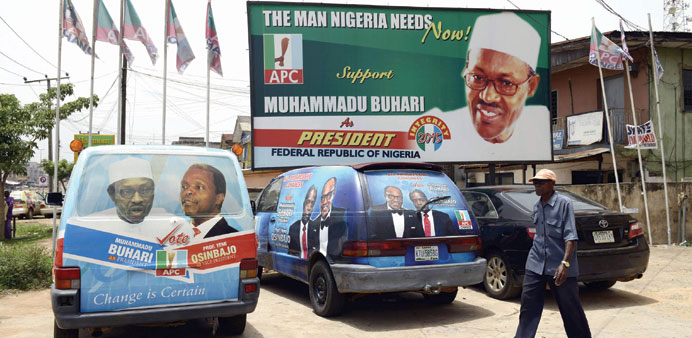A man walking past a billboard and branded campaign vehicles of the main opposition All Progressives Congress (APC) presidential candidate Muhammadu Buhari and running mate Yemi Osinbajo outside the APC campaign office in downtown Akure, Ondo State southwestern Nigeria. Nigeria, holds general elections on March 28 — the fifth since civilian rule was restored in 1999.
By Kristin Palitza/Abuja/DPA
Nigeria’s capital, Abuja, is plastered with campaign posters and billboards. Many show pictures of President Goodluck Jonathan, who promises “continuity” for Africa’s strongest economy.
“One good term deserves another. Let’s do more,” a poster reads, depicting a confidently smiling Jonathan, 57, wearing his characteristic black, wide-brimmed hat.
His main challenger, Muhammadu Buhari, meanwhile portrays himself as Nigeria’s “only saviour”.
“Who would you trust with your life?” Buhari asks on his billboards, highlighting Jonathan’s battle against the militant Boko Haram group that killed more than 13,000 people since 2009.
The retired army general, who ruled Nigeria for two years with an iron fist after taking power in a military coup in late 1983, believes he knows best how to stop the militants.
Even though Jonathan’s government has made major strides against Boko Haram in the past six weeks - after it postponed elections initially set for February 14 due to insecurity that would prevent tens of thousands of people from voting - north-eastern Nigeria remains extremely volatile.
The insurgents, who were in control of about 130 villages and towns in January, were pushed out of all but three local government districts, the military claims. But the fear of terrorism will remain when Nigeria’s 68.8mn registered voters head to the polls on March 28.
“The army has made gains, but there continues to be a high risk of Boko Haram stepping up attacks,” says Martin Ewe, researcher at the African Institute for Security Studies.
Eleven presidential candidates will compete for the highest office, but effectively, it will be a race between Jonathan and his ruling People’s Democratic Party (PDP) and Buhari and his All Progressives Congress (APC), a coalition of Nigeria’s three largest opposition parties.
Voters are split right down the middle, according to a recent survey by research firm Afrobarometer. A total of 42% of respondents said they will vote for the PDP. Another 42% plan to tick the APC box.
It will be “the closest election on record”, says Afrobarometer researcher Nengak Daniel.
Nigerians are known for voting along religious and geographic lines. About half of Africa’s most populous nation of 178mn people are northern Muslims, while an estimated 45% are southern Christians and 5% belong to traditional African religions.
Jonathan has a lot to show for his first term: steady economic growth, an improved railway system, privatised power generation and increased local participation in the oil and gas industry.
But his PDP faces challenging times: months of infighting have weakened the party, major corruption allegations angered the public, and tumbling oil prices deeply hurt public revenues and put the economy under substantial pressure.
Most importantly, Boko Haram, which recently pledged allegiance to the Islamic State group, is still not under control. Many Nigerians feel recent successes - achieved mainly due to military support from neighbouring Chad and Niger - are too little, too late.
“The gains against Boko Haram haven’t done much for Jonathan. Rather than working for him, it has worked against him. All the time he had capacity but did nothing,” says Nkwachukwu Orji, Nigeria expert at the German Institute of Global and Area Studies (GIGA).
Although 20% of the national budget is reportedly earmarked for defence, experts say most of it flows into the pockets of corrupt officials.
“The budgetary allocation is mainly on paper,” civil rights activist Shehu Sani tells DPA. “The money disappears in dark channels, while the army is ill-equipped and lacks training.”
Buhari is trying to profit from this criticism. He promises to restructure the police and army and provide specialised training and modern equipment, if elected.
Buhari’s critics attribute to his downfall to his strong views in the past. The 72-year-old, who was defeated in three previous presidential elections, called for the enforcement of Shariah law during his 2011 campaign, the year he lost against Jonathan.
When Jonathan’s victory was announced, riots broke out in the Muslim north and hundreds of people, mainly Christians, were killed. Thousands of homes were burnt down.
This year, Buhari has pledged to support religious freedom and teamed up with a Christian running mate, Yemi Osinbajo, to prove it. But analysts believe violence triggered by a close election result remains extremely likely.
“The circumstances that surrounded the 2011 elections are quite similar to the political atmosphere (today),” human rights lawyer Emmanuel Ogebe said.
“The 2015 elections appear to be polarising into essentially yet another Christian versus Muslim contest.”

